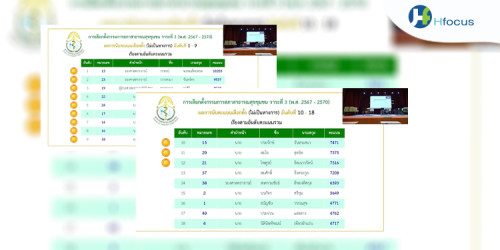Thailand is developing valued-based healthcare to lay a foundation for sustainable healthcare system.

Rifat Atun, Professor of Global Health Systems at Harvard University
Spoke during Thailand Value Based-Healthcare and Primary Care Reform seminar at Richmond Hotel on Monday (6 Aug), Rifat Atun, Professor of Global Health Systems at Harvard University, and the Director of Global Health Systems Cluster at Harvard T.H. Chan School of Public Health, said that valued-based healthcare associated with major principles such as optimized cost and outcome, increasing transparency benchmarking, shared accountability for outcomes and sharing risks and rewards among stakeholders.
One of the key components is data and information system with real time analytics, which can lead patients to behavior changes.
The seminar, organized by Public Health Ministry’s Department of Medical Service in collaboration with Division of Health Economics and Health Security and Bureau for Strengthening Primary Care and Family Clinics and Medtronic(Thailand) Ltd. brought up healthcare experts to discuss about how to achieve valued-based healthcare approach.
Jiruth Sriratanaban, an academic from Chulalongkorn University’s Faculty of Medicines, said that adopting value based-health care in Thailand would improve healthcare quality and save over five to eight billion baht a year from unnecessary cost.
Two years ago, the Public Health Ministry set up a sub-committee to develop value based-healthcare system which is centered around the concept of “SAFE”---Sustainability, Adequacy, Fairness and Efficiency.
Since 2015, SAFE has been developed by the ministry in collaboration with academics, medical practitioners and civil society groups to find sustainable financial models that will lay foundations for accessible and equitable healthcare in Thailand.
Six areas are targeted in development of valued-based healthcare---rational drug use, chronic diseases, preventable illness, inappropriate health service utilization, hospital acquired conditions and preventable long-term disabilities.
However, Dr Jiruth said that some specific contexts of Thailand must be taken into account. The country’s healthcare system is not run by a single player, but by three operators of healthcare schemes which have different beneficiaries, reimbursement system and service conditions. Unlike superpower nations, Thai health budget is inadequate. Over 75 per cent of health providers are state-own. Each of them occupies variation of resources and cares patients in different contexts.
“With all these conditions, when adopting valued-based healthcare, we should pay for desirable outcomes or care services that leads to outcomes,” said Dr Jiruth. “We also need to fix how much and how to pay.”
In Feb, his team proposed Public Health Ministry a roadmap for Thailand to set up valued-based payment. First, healthcare service guideline must be introduced with focus on improving primary care. The next steps will be finding healthcare delivery mode that balancing outcome and cost, increasing health information integration among stakeholders and setting up contracting payment model.
“A huge part of valued-based healthcare is data,” said Hsein-Hsein Lei, Vice President of Medical and Scientific Affairs, Asia Pacific at a medical device company Medtronic.
The company has developed a framework to connect patients, clinicians and data to help managing high-cost patients who suffered from complex, chronic and comorbid diseases including hypertension and chronic kidney failures.
created a software which link patients to their health records and previous health providers. They can be taken care outside clinics or at home while clinical staff can follow them by calling or sending messages. Patients can also have more engagement with clinical treatment and better knowledge about how to take care of themselves through data.
In another case, Medtornic introduced healthcare education apps on smartphone to track diabetes patients and provide information for them to adjust lifestyle.
Atun said that many countries such as UK and Sweden had achieved valued-based healthcare. He highlighted the keys to succeed valued-based healthcare system including consulting with all stakeholders to identify problems and established system needs. It’s important to look at current practice---what is working and not working for local contexts. He added that constructing environment for constant improvement, fair competition and innovation creation was in need.
ไทยเร่งพัฒนา Value Based-Healthcare เพิ่มประสิทธิภาพ พัฒนาระบบการจ่ายเงิน


- 129 views








